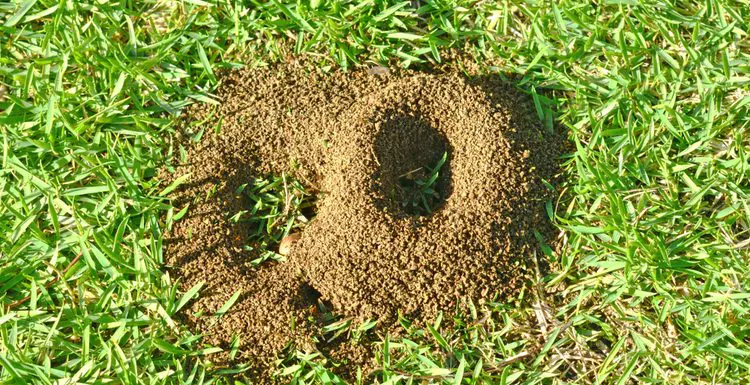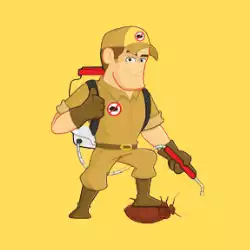Uh oh, you have ants in your yard, don’t you? It’s annoying, but it’s an easy problem to solve.
Read on to learn about how to get rid of “ants in the yard” with both natural and more abrasive chemical options.
We partnered with Networx to help you find local pest control techs. Click to below to get a FREE quote.
How to Get Rid of Ants In a Yard
The simplest way to get rid of ants in the yard is by using everyday items you’d find in and around the home.
Examples include white vinegar, pepper, and salt. Each of these natural methods rids your yard of ants without exposing your kids and pets to any health risks or damaging the lawn in the process.
Let’s see some of them!
1. Soapy Water
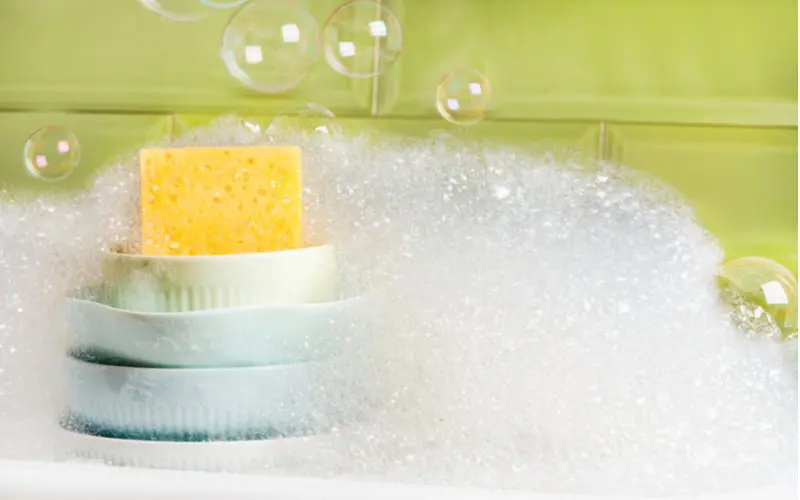
Svetlana Monyakova/Shutterstock
Soap and water are a tried-and-true natural way to get rid of ants. You can make soapy water with several recipes.
Some recipes require baking soda, vinegar, apple cider, and peppermint oil. However, tap water and eco-friendly soap work just fine on ants. To make a 2% insecticide spray, add one spoonful of soap and a quarter gallon of water.
After mixing the ingredients, pour the soapy liquid into a spray bottle and spray on any plants, visible ant trails, or colonies. The combination weakens ants’ inherent water resistance, thereby killing any ants it touches.
Soapy water can also remove the ant’s chemical trail, which they use to communicate and send signals to other ants. You can also get rid of ant hills by pouring soapy water into the ant pile to kill the colony.
2. Cayenne Pepper or Chili

Thanatip S./Shutterstock
Another way to exterminate ants in your lawn is to surround their mound with cayenne or chili pepper; ants can’t stand it.
You can also mix the cayenne or chili pepper with ground coffee to make it more efficient. However, be very careful — pepper burns when you get it in your eyes.
This method is safe as long as you don’t have pets that can ingest the pepper. To make this solution even more potent, try mixing the chili or cayenne pepper with water to mask ant trails and destroy the ant mound.
3. White Vinegar
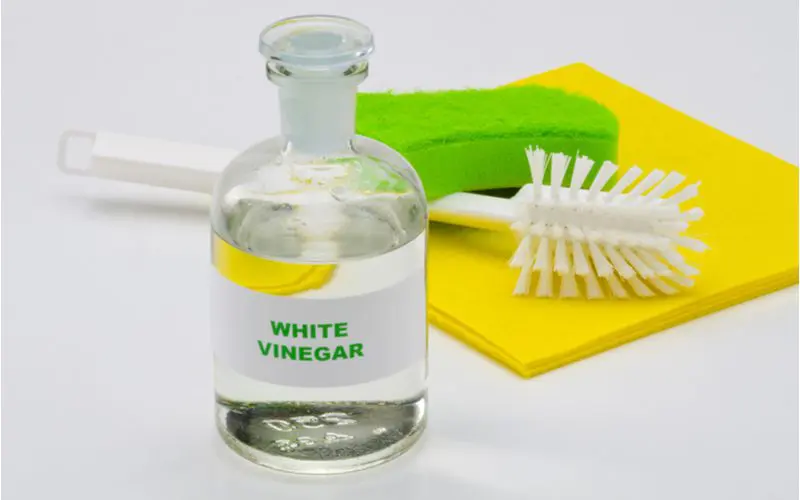
Pat_Hastings/Shutterstock
Also, try adding white vinegar to the water and spraying it on the infected area. Ants’ bodies are unable to survive the acidity. As a result, the acid in vinegar kills ants. Pouring the fluid inside the anthill is another option.
Vinegar is a harmless technique to get rid of ants, but it may damage plants in the process. Because the acidity might harm your plants’ topsoil, use this method with caution, and expect to see some brown grass as a result.
4. Baby Powder

MIA Studio/Shutterstock
Ants breathe using spiracles, which are pores in their exoskeleton, and baby powder’s tiny particles can block these pores. It depletes the ants’ ability to absorb oxygen.
Homeowners can take advantage of this by spraying baby powder wherever they find ants. If you don’t have any baby powder, baking powder is another efficient option.
5. Cinnamon Oil
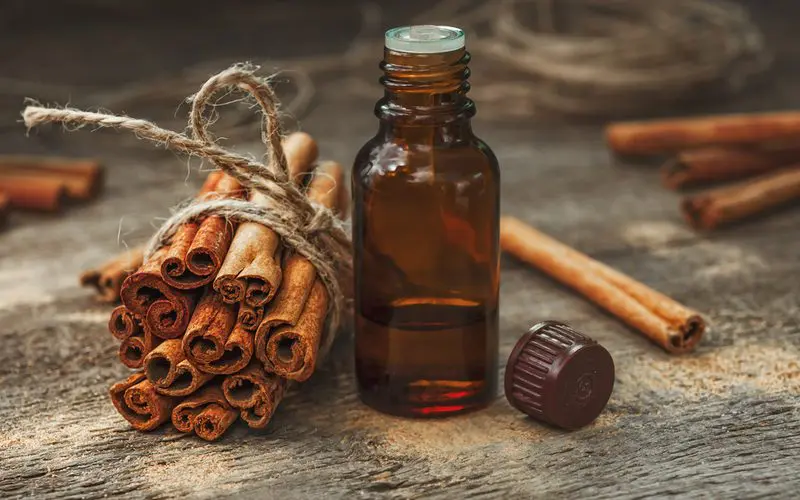
Bukhta Ihor/Shutterstock
This oil kills ants, but too much cinnamon might damage plants. Add a few drops of cinnamon oil to water to make a natural insect repellent.
You can use cloves or ground cinnamon if you don’t have cinnamon. It’s unlikely to be as efficient as cinnamon oil, but it still works decently well.
6. Salt

Alesjab/Shutterstock
Salt is a common household ingredient, but you can use it as an ant repellant since it is a desiccant that can dehydrate the ants’ exoskeleton. You can also spray this potent combination on ant trails or ant holes.
However, we don’t advise spraying a large quantity of homemade saltwater mixture, as it can be lethal to plants and vegetation. If you live in the Midwest, you know what driveway salt does to your lawn and garden if you use too much.
7. Diatomaceous Earth (DE)
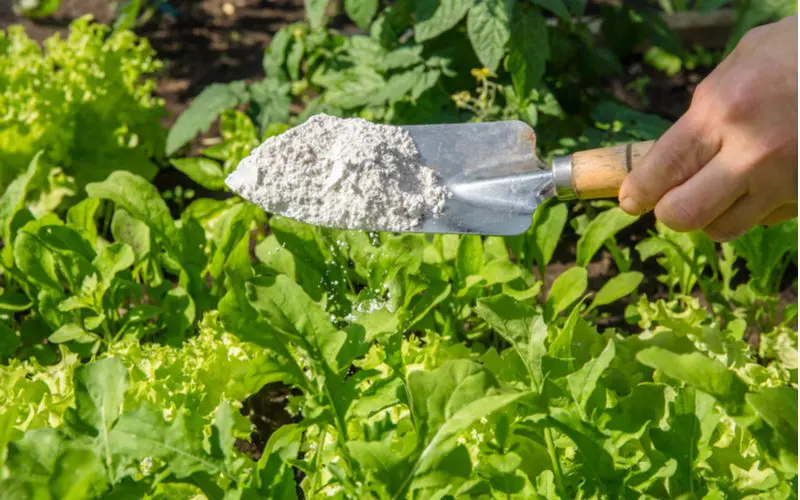
DE is a food-grade substance made from the crushed fossilized bones of diatoms, or tiny algae. DE kills ants because of its sharpness, but it can’t hurt people.
In fact, some people eat it. Plants benefit from DE’s nutrients in addition to eliminating ants. This is why it’s great to use in a yard.
Because DE is mineral-based, it contains calcium, magnesium, potassium, and other nutrients that will benefit your lawn.
Food-grade DE is a low-cost and excellent natural option if you’re concerned about getting rid of ants in yards within a short period of time. What’s more, it is safe for your pets and kids.
DE comes in two varieties: food-grade and industrial-grade. You may safely use the food-grade DE around children and pets because it is okay for human consumption. On the other hand, you should only use industrial DE in pool filters and not substitute it for food-grade DE.
8. Deterrence

Gorodenkoff/Shutterstock
Being proactive is often the best way to solve household problems. If you notice ant trails leading to your garbage bins, organic waste, or compost pile, try to move them away from your yard.
If you remove their food source (and remove their scent trail with soap), they won’t have any reason to return.
You can also use a natural repellent such as salt or soapy water to keep the ants from getting to these places. The repellent will deprive ants of their food source, ultimately killing them.
How Can I Get Rid of Ants Permanently?
Any of the methods we recommended above should give you a lasting solution to the problems of ants in your yards. If problems persist, consult a professional exterminator.
What are pet-safe methods to get rid of ants in yards?
Using chemicals to get rid of ants can threaten other living creatures around, including your pets and even kids.
There are several safe ways to exterminate ants in yards without risking your pet’s life. The methods include using soapy water, salt, baby powder, and cinnamon oil.
When to Call an Exterminator
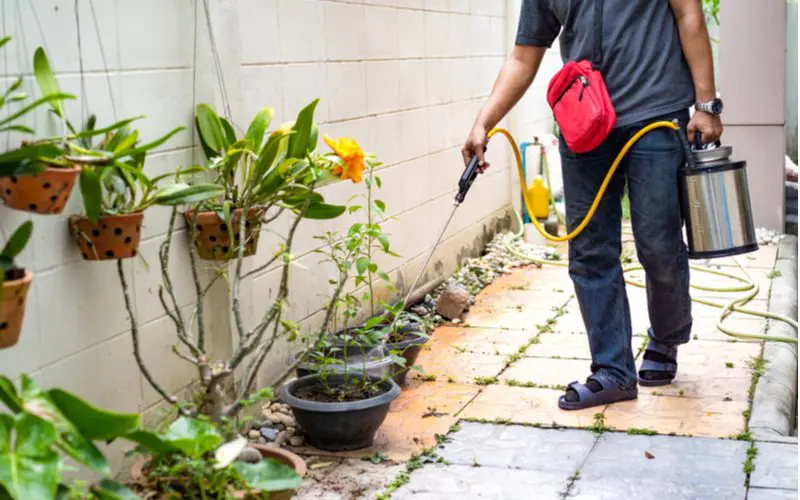
Surachet Jo/Shutterstock
When is it okay to call for professional help in getting rid of ants in yards?
When you’ve tried all other options but the ants keep coming back, you might decide it’s time to bring in a professional exterminator. These pros have the necessary training and chemicals to eradicate the problem permanently.
Stinging Ants
Don’t try to get rid of ants by yourself if you notice that they sting. Calling in an expert is the best option.
Examples of ants and other insects that sting include hornets, wasps, fire ants, and bees, and they all share similar traits and behaviors, including how they construct their mounds and nests.
Recurring Ant Infestation
If your yard has experienced multiple occurrences of ant infestations within a short period of time, it’s time to call a professional exterminator. If ants keep returning despite repeated DIY treatments, something is wrong somewhere.
Calling a qualified expert is the best method to manage the infestation; they can also advise you on avoiding future ant infestations.
The Ants are Damaging the Building
Wood-dwelling ants do not consume wood as termites do, but they may inflict significant damage during an outbreak.
Carpenter ants and other wood-dwelling ants prefer hollow areas and keep digging into wooden structures as they expand their colony. If you see any infestation symptoms that threaten your building, consult a specialist.
We partnered with Networx to help you find local pest control techs. Click to below to get a FREE quote.
Permanent Rid Your Yard of Ants
Although ants serve a vital role in your lawn’s health, they may be a pain in the neck, especially if you have ant mounds in your yard or tiny critters devour your plants.
Now that you’ve learned about possible ways to exterminate ants, you can rest assured that you’ll get rid of the ants without using hazardous chemicals that might endanger your children, vermin, or pollinators.

